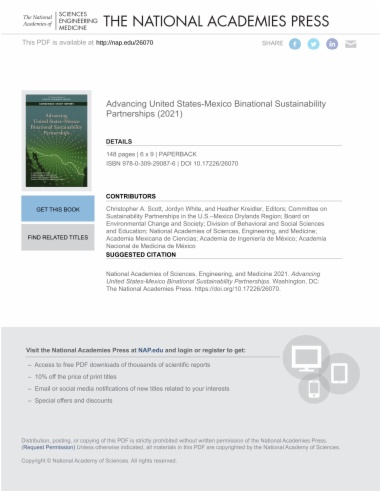

The border region shared by the United States and Mexico is currently experiencing multiple crises on both sides that present challenges to safeguarding the region's sustainable natural resources and to ensuring the livelihoods of its residents. These challenges are exacerbated by stressors including global climate change, increasing urbanization and industrialization and attendant air and water-quality degradation, and rapid population growth. Navigating these challenges and preserving the area's cultural richness, economy, and ecology will require building strategic partnerships that engage a broad range of stakeholders from both countries.
To navigate these challenges, the U.S. National Academies of Sciences, Engineering, and Medicine, together with the Mexican Academy of Sciences (Academia Mexicana de Ciencias), Mexican Academy of Engineering (Academia de Ingeniería de México), and Mexican National Academy of Medicine (Academia Nacional de Medicina de México), appointed a committee of experts from the United States and Mexico to conduct a consensus study.
Advancing United States-Mexico Binational Sustainability Partnerships incorporates features of the United Nations 2030 Agenda for Sustainable Development, in particular, Sustainable Development Goal (SDG) 17. SDG 17 calls for revitalizing global partnerships for sustainable development. It is specifically focused on the advancement of multi-stakeholder partnerships that require coordination and collaboration among diverse stakeholders in pursuit of a common and mutually beneficial vision. With attention to SDG 17, this report draws on social science theory and applied research on partnerships to explore potential strategies and mechanisms to increase coordination between relevant government agencies, the private sector, and civil society in the United States and Mexico.